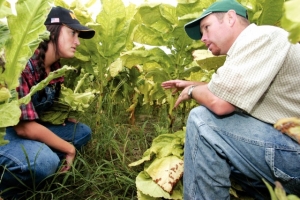Tobacco and chickens: It's about more than just farming, it's about family
By Laura Collins
Published in News on September 14, 2009 1:49 PM

News-Argus/BOBBY WILLIAMS
Farmer Paul Daw, right, instructs reporter Laura Collins on how best to remove suckers from tobacco plants.
EDITOR'S NOTE: This the second installment of a new series by News-Argus reporter Laura Collins. She will be spending time doing various jobs around the community.
The Company: Daw Farms
The Job: Farmer
The Location: Tobacco fields and poultry house
My day in the life of a farmer brought about one striking realization: I'm not nearly as "good at everything" as I thought I was.
The day started off on the wrong foot when I was pulled over heading to Daw Farms at 7 a.m. I was speeding. Allegedly.
The trooper asked me where I was heading so fast.
"Tobacco farming."
"What?" he asked.
"Yes, it's real. I promise. If I was lying, I don't think I could be this creative."
Dressed in borrowed Carhart overalls, a plaid flannel shirt and an NRA hat, there's really not a lot of other places I could have been going. Maybe a barn raising.
I thought the outfit was a good idea. Admittedly, I've never been on a farm before, but in the movies, farmers usually have on overalls and plaid. About midway through the day, I regretted the overalls when I glanced down and saw the tail of my shirt was poking out through the button fly of the overalls. Not good. "Luckily" the photographer got shots of it, yet never actually told me I looked like a 6-year-old.
On to the farming.
I spent the day shadowing and learning from Paul Daw and his father Delanor Daw. We started by baling tobacco, which is apparently something that only people who have never actually baled tobacco say. To the pros it's "taking out" or "balin' 'baccer." It amounts to removing the dried tobacco from the curing barns for shipment.
For the Daws, the process began back in February with growing young tobacco plants from seed in a greenhouse, then transplanting them to the field in the spring. By the end of the season, the 100 acres of tobacco should produce about 600 bales, all weighing between 750-800 pounds. I helped with four bales and was ready to call it a day. But these men work without slowing, baling more than three times that on an average morning before moving on to their other responsibilities around the farm.
No one warned me about the other responsibilities.
Paul Daw said we were headed to the poultry houses. I assured him I'm familiar with chickens because my dad has five or six. Wrong, I am not anywhere near as familiar as I should have been. The Daws have more than 72,000 chickens.
I stepped into the first chicken house, which held about 27,500 of the four-day-old chicks, and felt like I hit a brick wall that smelled like ammonia-poop.
"You'll get used to the smell," he said.
"I'll just breathe through my mouth until then."
Daw handed me a bucket and stick and told me to pick up any dead ones. I laughed.
"No really, what should I do with this bucket?" I asked.
"Pick up the dead chicks," he repeated. So I walked up and down the rows, simultaneously tossing the dead chickens into the bucket and trying not to step on the live ones that kept running under my feet, not because I was worried about hurting them, but because if I did in fact kill one, I would have to be the one to pick it up and put it in my bucket. I learned that it's not uncommon for a poultry house to have several dead chickens each day, but it's important to remove them so no other chickens get sick.
We rounded out the day back in the tobacco fields. This time the crew was "taking in," harvesting tobacco leaves from the fields, loading them into containers and then putting them into the barns to be cured. I learned that farming is much more than hard labor, there's a science to raising the crops. These farmers have to be more multi-functional than a pocket knife. They have to be chemists, physicists, botanists and willing to gamble on the weather.
"Everything in farming depends on the weather. You can work really hard and have a good crop and everything can be destroyed overnight," Paul Daw said.
Delanor Daw agreed: "When you farm, the weather dictates everything you do. It makes you good or bad. We depend on the good Lord for everything we do."
While in the fields I got a taste of what harvesting tobacco was like before machines.
It was not a good taste.
The work is hard, the plants are sticky with resin, and the summer heat only adds to the difficulty. I got a quick second with Delanor Daw, late in the afternoon. He had been working with the tobacco since sunup.
"You're 61 years old, why are you out here working every morning?" I asked.
"What else would I do?" he answered simply, before walking away to check on the harvester.
In a few words he summed up the feeling on the Daw farm. For Paul, a fourth-generation farmer, and his father, it's more than their job, farming is the heartbeat of their livelihood. Paul's grandfather cleared the woods by hand that is now the family's fields. It's their tradition and their pride.
"You've got to love farming. I've got two degrees, I could get a job somewhere else, but I love it. I take pride in it," Paul said. "My grandpa passed four years ago, and I feel him right here with me, and his father. I'm proud of it."
